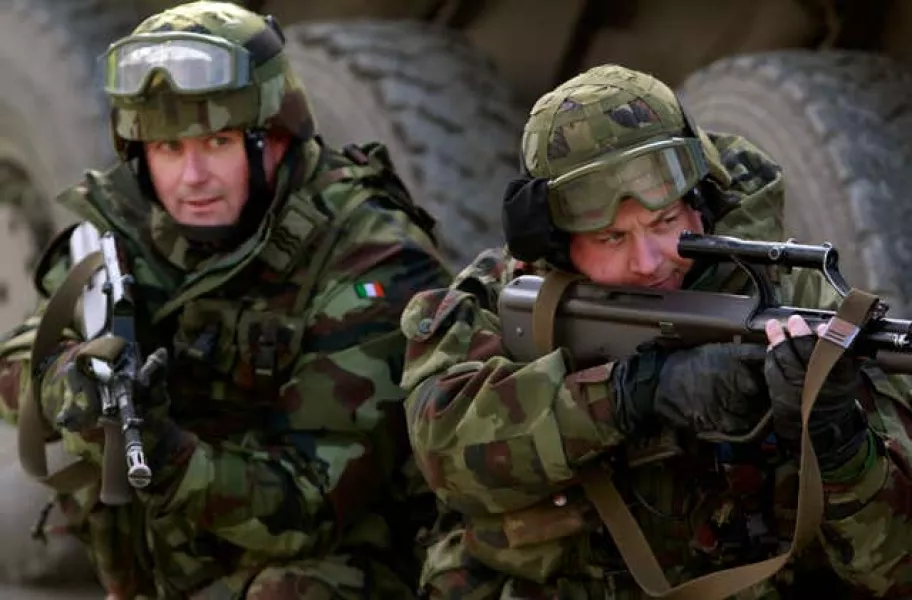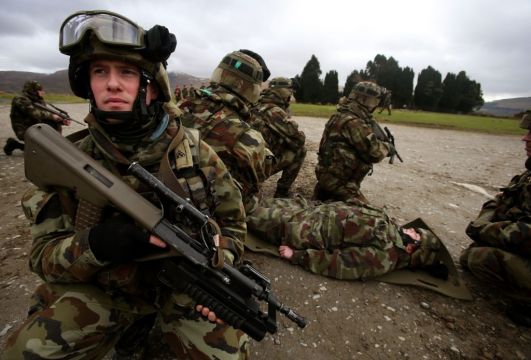The fate of Ireland’s Reserve Defence Force is “precarious”, an Oireachtas committee has heard.
Neil Richardson, the general secretary of the Reserve Defence Force Representative Association, told an Oireachtas committee on Tuesday that the force was at the “lowest point in its history”.
Mr Richardson described a force that exists on a budget that amounts to “peanuts” and one that is often lacking in State supports.
The appearance at the Foreign Affairs and Defence Committee comes amid the ongoing work of the Commission on the Defence Forces, which is expected to report on the state of the Irish defence forces in the coming months.
In his opening statement, Mr Richardson said that two paths lay ahead for the force.
“The Reserve Defence Force will either wither away to nothing and finally cease to exist, or it will be given a meaningful, modern purpose and become a fully integrated, utilised and utilisable element of the defence forces,” he said.
Throughout the committee appearance, representatives painted a portrait of a force in crisis — one that is often overlooked by the authorities and is in need of significant investment.
The force’s budget, representatives said, has remained static since 2014 and is currently €2.15 million per year — 0.26 per cent of the defence forces’ budget.
The representatives said it can take between a year and 18 months for an applicant to become a fully attested member of the reserve force.
They said in 2014 the force had received 4,870 applicants, but only 157 made it through the months-long process to become a reservist.
In some cases, representatives said, a military medical certificate can be rendered void due to delays in applicants progressing to the next stage of training.
“Likely, several months after the last stage (at which) they were contacted, they simply lost interest,” Mr Richardson said.
“Even if they handed us 1,000 recruits in the morning, we might shortly get to a point where we can’t train them ourselves.”
Senators and TDs were told that some counties had no reservist training centres — forcing members to travel significant distances to train, often at their own expense.
Mr Richardson said that some reservists had been forced to consider whether they could afford to stay in the Reserve Defence Force.
“Once you look into it, you can start to see why reservists stop turning up any more because it comes at a net cost to themselves,” he said.
They praised the engagement from the commission, but insisted that “urgent action” was needed to ensure the future survival of the force.
The representative association put forward a number of potential solutions, including redefining reservists as “part-time workers” as opposed to “volunteers”.
The association said that a form of employment protection legislation would be needed to facilitate this change to ensure that reservists’ employment could be protected if they were called up.
They also suggested that a support could be introduced for employers in the event of staff being called for duty.
Mr Richardson said that “schemes have existed for many years in other states, and there are multiple successful examples to study and learn from”.

Representatives declined, when asked by members of the Oireachtas committee, to put a finger on what an “ideal budget” would look like.
Eugene Gargan, president of the association, said: “I wouldn’t suggest a figure off the top of my head.”
Mr Gargan said that to answer that question, it needs to be worked out what the objective of the force should be.
Jo McCarthy, the association’s vice-president, also rejected the suggestion from Senator Joe O’Reilly that designating members as “part-time workers” might reduce the “volunteerism” of the force.
“No one is in this to make money,” she told the committee.
Representatives also cast doubt on whether reservists would be ready to deploy overseas if needed.
Legislation currently being debated in the Seanad and already passed in the Dail is intended to allow overseas participation for reservists.
In response to a question from Independent TD Cathal Berry, Mr Gargan said that in theory this could happen immediately.
But he said that in reality, it is probably “limited to who is available to go” due to concerns about reservists being able to take time away from work and other commitments.
“There would probably be a requirement to have a look at employment protection,” he said.
Committee members also reacted with shock to the revelation that the recommendations from a major report on the defence forces, dated from 2015, had not been introduced.
Mr Richardson told the committee: “Not one of the Reserve Defence Force projects arising from the 2015 White Paper on Defence has been initiated to date.”
“So there are understandable fears within the Reserve community that any Reserve-specific recommendations arising from the work of the Commission on the Defence Forces — even those accepted for implementation — will never be acted upon,” he said.
Committee chair Charlie Flanagan called the findings “stark”.
“It is essential, in whatever recommendations are contained in the Commission, there would be a timeline in terms of implementation,” he said.







